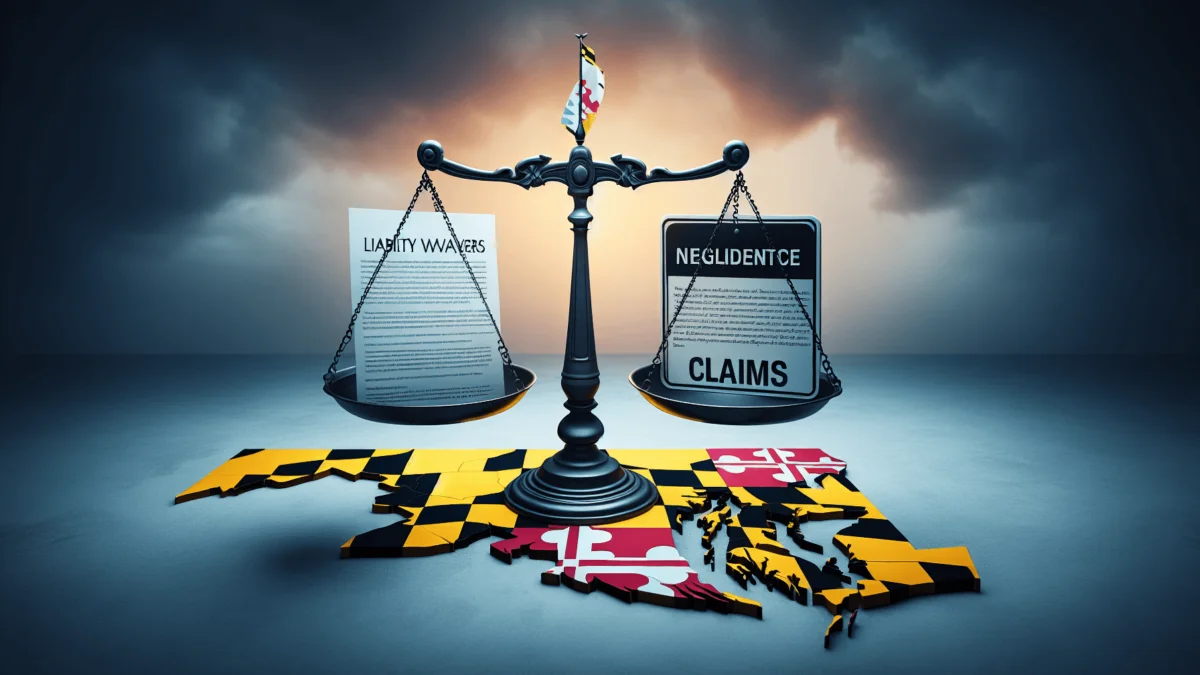
How Long Do You Have To File A Lawsuit In Maryland?
February 20, 2024
Maryland Car Accident FAQ
March 4, 2024Liability Waivers in Maryland
In Maryland, liability waivers are a legal fixture for businesses seeking to shield themselves from negligence claims should a customer sustain injuries — a practice both common and complex. These written agreements are typically enforceable within the state, notwithstanding certain exclusions, such as cases involving ambiguous wording or gross negligence on the business’s part. Given the stakes for both the companies that employ them and the individuals who sign them, understanding the scope and boundaries of such waivers is critical for all involved parties.
This article delves into the intricate tapestry of Maryland’s liability waivers, shedding light on when and how they provide protection and the conditions under which they may falter. From the nuances of signing waivers on behalf of minors to the intricacies of challenging a waiver in court, it aims to equip readers with practical insights and advice, offering a legal compass in navigating these pivotal documents. Whether you’re a business owner, an adventurous consumer, or a parent, staying informed and seeking expert counsel can be imperative before affixing your signature to a waiver of liability.
Understanding Liability Waivers in Maryland
In the realm of Maryland’s legal landscape, liability waivers, or “exculpatory clauses,” serve as a critical line of defense for businesses against negligence claims. These documents articulate that the participant acknowledges the inherent risks of an activity and consents to partake at their own peril, effectively absolving the company from liability for potential injuries. Here’s how they typically function:
- Acknowledgment of Risk: Participants affirm their understanding that they are engaging in activities that carry inherent risks, and they do so at their own volition.
- Release of Liability: By signing, they relinquish the right to hold the company accountable for any harm that may arise from ordinary negligence.However, Maryland courts uphold these waivers with a discerning eye, ensuring they adhere to legal standards and are not marred by ambiguities or unfair terms. For instance, a waiver may not shield a company from liability if it is found to contain vague language or if the negligence was willful or reckless. Furthermore, the courts consider the public interest and whether there was a fair balance of power between the parties involved.
Legal Boundaries of Waivers
In the examination of liability waivers in Maryland, the courts have delineated clear legal boundaries to ensure fairness and uphold public policy. The enforceability of these waivers is contingent upon several crucial factors:
- Express Terms and Clarity: The waiver must be unambiguous and its terms explicitly stated. Maryland law allows for the contractual limitation of remedies and warranties, but this is only valid if the language within the waiver is clear and specific.
- Prohibition of Gross Negligence: Maryland courts will not enforce waivers that attempt to absolve a company of responsibility for conduct that is willful, wanton, or recklessly negligent. Such behavior goes beyond the scope of protection that a waiver of liability can provide.
- Public Interest Consideration: A waiver may be deemed unenforceable if it is contrary to public policy or involves transactions that significantly affect the public interest.
Cases Where Waivers Fail to Protect
Despite the general enforceability of liability waivers in Maryland, there are instances where such waivers fail to provide the intended protection against negligence claims. These exceptions arise from specific legal principles and case precedents:
- Parental Consent on Behalf of Minors: In the notable case ofRosen v. BJs Wholesale Club, the Maryland court held that a parent cannot waive a minor child’s future negligence claims against a commercial enterprise. This decision emphasizes that while parents can make many decisions on behalf of their children, signing away a child’s right to legal recourse is not one of them.
- Circumstances of Signing: TheBarber v. Eastern Karting Co. case highlighted concerns about waivers being presented at a time and place that might not allow for a fair and informed choice. The court scrutinized the practice of offering waivers only at the event’s entrance, suggesting that such timing could pressure participants into signing without fully understanding the implications.
- Exclusions for Certain Types of Negligence: Maryland courts will invalidate waivers that encompass fraudulent, mistaken, patently offensive actions, or injuries resulting from intentional or willful misconduct by the organization or its employees. A waiver of liability must be clear, unambiguous, and the signing volunteer must comprehend the legal rights at stake, ensuring they are releasing the organization and its representatives from liability for ordinary negligence, not for egregious acts.In summary, while a waiver of liability is a powerful tool for organizations to limit legal exposure, Maryland law and courts have carved out exceptions to protect individuals from unfair and uninformed waiver agreements, particularly when it involves minors or conduct beyond ordinary negligence.
Signing on Behalf of Minors
In the context of Maryland’s legal framework for liability waivers, the act of parents signing on behalf of minors carries significant weight. The state’s highest court has affirmed that a parent can sign away a minor’s right to sue, as evidenced in the BJ’s Wholesale Club case, where a child’s use of the store’s “kids’ club” was contingent upon such a waiver. For these waivers to be enforceable, they must meet certain criteria:
- Specificity and Intent: The waiver must explicitly state the defendant’s intention to release themselves from liability for their own negligence. This clarity is crucial to avoid any ambiguity that could render the waiver unenforceable.
- Bargaining Power: The relationship between a parent and child does not inherently suggest an imbalance in bargaining power when signing a release for recreational activities like a kids’ club. The courts do not view such transactions as having an inherent public service obligation that would otherwise nullify the waiver.However, there are circumstances where a waiver might not withstand legal scrutiny:
- Unclear Wording: If the terms of the waiver are not clear, its enforceability can be challenged.
- Type of Organization: Waivers issued by government agencies or non-profit corporations may be subject to different legal standards.Importantly, while parental waivers are generally upheld in Maryland, exceptions do exist. These include situations involving intentional or grossly negligent conduct, grossly unequal bargaining power, or transactions that significantly affect the public interest. Additionally, minors may be prevented from voiding contracts induced by their own fraudulent misrepresentation, such as lying about their age.
In cases of injury at an entertainment venue, the plaintiff’s ability to recover damages may be influenced by either the comparative negligence or contributory negligence doctrine, with the applicability depending on the jurisdiction within Maryland. These doctrines take into account the actions of both the plaintiff and the defendant when determining liability and compensation.
Understanding these nuances is essential for both parents and businesses to navigate the complexities of liability waivers in Maryland.
Practical Tips Before Signing a Waiver
Before appending one’s signature to a liability waiver in Maryland, it is advisable to exercise due diligence. Here are some practical tips to consider:
- Fully Understand the Risks: Acknowledge the inherent risks and potential dangers of the activity. Ensure that you have a comprehensive understanding of what you are about to undertake. This is crucial as liability waivers may not always protect businesses from legal action in cases of gross negligence or reckless behavior.
- Read the Fine Print: Scrutinize the waiver’s language for any ambiguous terms that could affect its enforceability. Liability waivers should be clear and conspicuous, complying with state laws, public policy, and contract law principles.
- Consider the Implications for Minors: If you are signing on behalf of a minor, be aware that while the waiver can be enforced, exceptions exist for egregious negligence or if the organization is a government agency or non-profit corporation.
- Legal Consultation: In the event of suffering an injury after signing a waiver, discuss your legal options with an experienced attorney. Maryland courts critically review liability waivers, and an attorney can help you understand where you stand legally.
- Know Your Rights: Remember that signing a liability waiver is optional, though refusal may prevent you from participating in the activity. If injured in an accident that wasn’t your fault, consult a law firm for help.
- Jurisdictional Variations: Be aware that exceptions to liability waiver enforceability vary in each jurisdiction; an experienced personal injury attorney can determine how the current state of the law impacts your legal rights.
Conclusion
As we have explored, Maryland’s nuanced approach to liability waivers requires businesses and individuals to thread carefully through a legal labyrinth that dictates their enforceability. Recognizing that while these agreements are generally upheld, their power is not without bounds is essential. Particular attention must be paid to the waiver’s clarity, terms, and the specific circumstance of gross negligence, which can render such protective measures void. This awareness is invaluable for the prudent navigation of rights and responsibilities when engaging in activities or services that necessitate these legal instruments.
In conclusion, whether you are a business owner, an adventure-seeker, or a concerned parent, a keen understanding of the intricacies and limitations of liability waivers in Maryland is crucial. Remaining well-informed and consulting with legal experts can prevent unforeseen legal challenges and reinforce the importance of thoughtful and well-informed participation in activities where such waivers are a factor. As the legal landscape continues to evolve, staying attentive to the subtle shifts that might affect liability and protection will be vital for all parties involved.
 FAQs
FAQs
Can liability waivers be enforced in the state of Maryland?
In Maryland, courts generally enforce liability waivers, with certain conditions where legal action may still be possible after signing such a document. For instance, waivers from commercial businesses are often upheld.
Are liability waivers designed to cover instances of negligence?
In the context of Maryland law, liability waivers do not protect against injuries resulting from gross negligence, recklessness, or intentional wrongdoing.
Are signed liability waivers legally binding in court?
For a liability waiver to be considered valid in court, it must have been signed voluntarily and with a clear understanding. If coercion, deception, or lack of knowledge played a part in the signing, a competent personal injury lawyer can challenge the waiver’s validity.
What does the contributory negligence rule entail in Maryland?
Maryland’s contributory negligence rule states that if an accident victim did not exercise reasonable care and this contributed even minimally to their injuries, they are completely barred from receiving compensation.
Under what circumstances can a liability waiver be deemed invalid?
A liability waiver may be considered invalid if it contains illegal or unconscionable terms, if the language is unclear or ambiguous, or if it was signed under deceptive conditions, fraud, undue influence, duress, or without proper understanding.
Does a signed waiver eliminate the possibility of filing a lawsuit?
While waivers include clauses that limit the ability to sue after an injury, they do not categorically prevent the filing of a personal injury claim, even after signing.
Is a waiver a foolproof defense in a lawsuit?
Even with a well-drafted waiver, courts may choose not to enforce it if doing so would contravene public policy or be deemed unconscionable.
What constitutes a legally binding liability waiver?
A legally binding liability waiver is a signed agreement between two parties that uses clear, explicit language, and is signed voluntarily with a full understanding of the risks being assumed.
How can negligence be proven in the state of Maryland?
To prove negligence in Maryland, it must be shown that a duty existed between the person responsible for the accident and the injured party, that this duty was breached through certain actions, that the breach was a proximate cause or closely related to the damages, and that actual damages occurred.
Is Maryland still operating under contributory negligence law?
Despite facing criticism and legal challenges, Maryland continues to operate under the contributory negligence law, which remains unchanged and in effect to this day.





